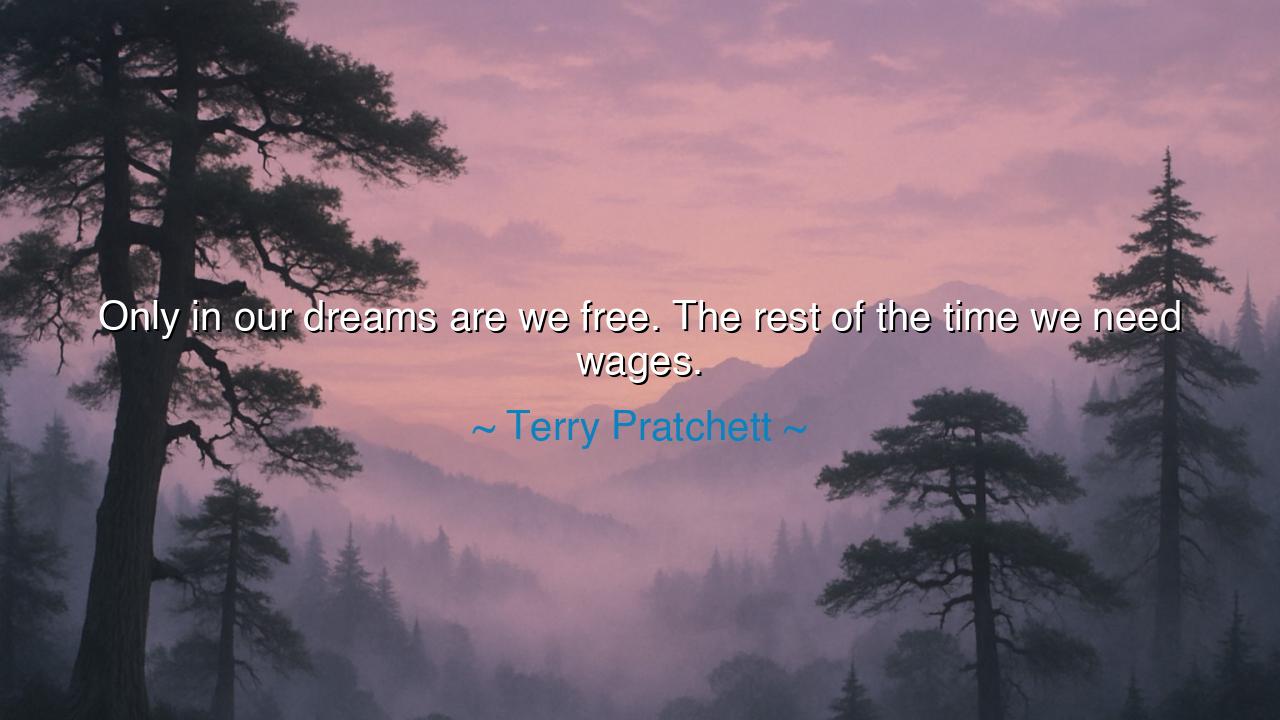
Only in our dreams are we free. The rest of the time we need






The words of Terry Pratchett, the great weaver of wit and wonder, cut through the fabric of modern life with both humor and sorrow: “Only in our dreams are we free. The rest of the time we need wages.” Behind this jest, as behind all of Pratchett’s wisdom, lies a truth as old as mankind itself—the eternal struggle between the spirit’s yearning for freedom and the world’s demand for necessity. The dream is the soul’s flight, unbound by the laws of coin or command; but waking life, bound to labor and survival, chains even the noblest heart. Thus, the quote is not mere satire—it is a lament, and a call to remember that within the prison of duty, there still lives the boundless kingdom of the imagination.
To understand Pratchett’s meaning, we must see him not only as a humorist, but as a philosopher cloaked in laughter. His words spring from the weary wisdom of one who gazed long upon the human condition. In his world of Discworld, where gods bicker and mortals toil, truth hides in the jest: men work, women labor, rulers scheme—but only in the quiet chambers of dreams do they find the freedom denied them by the weight of life. In that invisible realm, one may soar without wings, speak without fear, and love without consequence. There, the mind returns to its natural state—unfettered, fearless, and divine.
And yet, when the dawn returns, the dreamer must rise to serve the day. The world demands its due—wages, bills, duties, and tasks that grind the spirit dull. This is the ancient trade of existence: we sell our time to buy our bread. But the soul does not eat bread alone. It starves for beauty, meaning, and creation. Pratchett, in his gentle irony, reminds us that though the body must labor for survival, the heart still belongs to the realm of dreams. The man who forgets to dream becomes a machine; the one who dreams too much risks starvation. Thus, wisdom lies not in choosing between them, but in holding both—the bread of life in one hand, and the dream of freedom in the other.
History itself is the tale of those who dared to keep their dreams alive despite the world’s wages. Vincent van Gogh toiled in poverty, selling almost nothing of his art, yet his dreams—his colors, his visions of light—were richer than any emperor’s treasury. He painted not for coin, but for the joy of understanding beauty. The world paid him with loneliness, yet posterity paid him with immortality. Likewise, Nikola Tesla, who lit the modern age, died penniless but unbroken, for he lived more in the world of thought than of flesh. To such men, dreaming was freedom, and wages were a cage too small for the infinite.
But not all must suffer so. Pratchett’s wisdom is not a call to abandon the world, but to awaken within it. For even the laborer at his forge or the clerk at his desk may carry dreams within like a hidden flame. Freedom is not only the absence of chains—it is the presence of imagination. When a person can still dream while fulfilling the duties of life, when they can see poetry in the mundane and purpose in their toil, they become more than worker or servant—they become creator. And creation, whether of art, kindness, or thought, is the highest expression of freedom.
Therefore, O seeker of meaning, learn this: labor may claim your hours, but never surrender your dreams. The world will always ask for wages, but your spirit belongs to something greater. Keep a portion of your life untouched by the noise of necessity. Read, imagine, walk beneath the stars. Build small sanctuaries of wonder in the midst of your toil. For though society rewards conformity, only imagination nourishes the soul.
And when the night returns and sleep opens its gates, remember that in your dreams, you are your truest self—the free soul, the eternal child of creation. Carry a fragment of that dream into the waking world. Let it guide your choices, soften your burdens, and remind you that though the body must serve, the mind may always wander. For as Pratchett whispers through his gentle irony, the world may own your labor—but your freedom, your dream, and your wonder belong to you alone.






AAdministratorAdministrator
Welcome, honored guests. Please leave a comment, we will respond soon